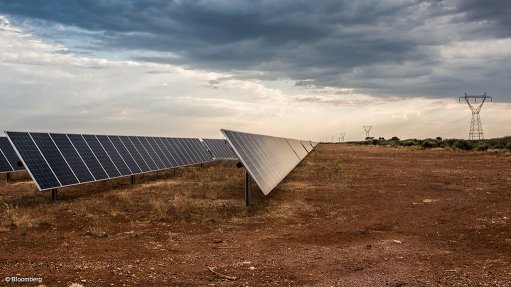
BOOSTER SOURCE
By potentially reducing diesel use and substituting it with alternative energy sources, such as solar, a substantial portion of the operational risk of a mine can be reduced
Photo by: Bloomberg
As the issue of access to power becomes increasingly elevated in importance for the African mining industry and is being highlighted as a key business risk or challenge, South African renewable- energy unit of giant US electricity utility NRG, NRG Renew Africa, notes that it has seen a significant increase in the number of mines requesting proposals for potential renewable-energy solutions in the past year.
“The African mining industry faces several challenges, such as rising energy costs and grid instability,” says NRG Renew Africa commercial and industrial project manager Bongani Mrara, noting that 20% to 40% of a mine’s budget can be attributed to power costs.
He also cites cases where mining operations had to face power curtailments, such as in Zambia, in July and August. Meanwhile, mines in Ghana have to navigate intermittent power availability, owing to a drought having affected the region’s hydropower plants.
Mrara believes that these power challenges will intensify in future as demand for electricity increases across the continent.
In light of this, NRG Renew Africa is currently involved in proposals for renewable-energy or hybrid power solutions for at least ten mines across Africa, says Mrara.
Proposals for energy solutions include a diesel- solar hybrid solution for a gold mine in East Africa, he says.
“The solution aims for a 25% penetration of solar, which means that the diesel volumes and costs of the mine would be reduced by 25% a year. The mine currently consumes more than 30-million litres of diesel a year,” Mrara points out, adding that the company expects to know by early next year if the mine has accepted the solution and would like to progress with it.
Other projects include solutions for a few local platinum mines and zinc, gold and bauxite mines in East and West Africa. “Currently, NRG is doing a lot of work in gold and platinum opportunities, but we aim to increase our footprint to cover other commodities,” Mrara says. He advises that “mines should review their procurement processes . . . buying energy is not like buying equipment”.
While the company’s US-based business has achieved significant success as an independent power producer, managing about 4 500 MW of renewable energy in the health, industrial, hospitality and sport sectors in the US, Mrara acknowledges that the current proposals for the mines are an industry first for NRG, which is emerging as a market player in Africa.
Services Outline
Should the company’s proposal be accepted, its services provided for the mines would include designing the solution and funding procurement for the project, such as debt and equity, as well as construction, operations and maintenance of a customised power plant. NRG will also manage the power purchase agreements, through which the power plant’s power will be sold to the mine.
Key advantages of NRG’s solution would include a reliable, more cost-effective and environment-friendly alternative to diesel power generation or an unstable electricity grid, Mrara explains.
While NRG Renew Africa would match a solution to the mine’s power requirement, another prominent service offering would be to improve the quality of the power supply.
“Several mines experience challenges in power quality, such as power dips or voltage regulation issues, which may affect production or equipment,” Mrara says, pointing out that the company’s recommendations could lead to enhanced production for the mines.
Mrara further notes a shift from diesel power generation to hybrid combinations, where a component of the power supply is replaced by more cost-effective renewable energy, such as solar, hydropower or wind power.
“Advantages of diesel replacement for mines include a reduction in diesel use and costs, and logistics costs, as well as security concerns, such as diesel theft,” Mrara reiterates, adding that, by reducing diesel use by up to 25%, a substantial portion of the operational risk of a mine can be reduced.
Material implications of diesel theft include damage to equipment, when diesel is substituted with water, for example, Mrara says.